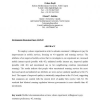Free Online Productivity Tools
i2Speak
i2Symbol
i2OCR
iTex2Img
iWeb2Print
iWeb2Shot
i2Type
iPdf2Split
iPdf2Merge
i2Bopomofo
i2Arabic
i2Style
i2Image
i2PDF
iLatex2Rtf
Sci2ools
TELE
2016
2016
Consumer preferences for improvements in mobile telecommunication services
We employ a choice experiment in order to estimate consumers’ willingness to pay for improvements in mobile services, focusing on 4G upgrades and roaming services. The attributes of an improved mobile service that we investigate in our experiment are: increased mobile internet speed (possible with 4G), unlimited mobile internet use, improved quality (possible with 4G) and unrestrained use in two neighbouring countries (unrestrained roaming). The results indicate that people value unrestrained roaming services the most. Increased speed and unlimited use attributes are next, and are similarly significant at the 1% level. The impact of improved quality is statistically insignificant at the 5% level, suggesting that consumers are content with the current level of quality they receive with 3G. We conclude that bilateral roaming regulation between governments is more valuable than 4G investments. Key words: Mobile telecommunication services; choice experiment; willingness to pay; consumer...
| Added | 10 Apr 2016 |
| Updated | 10 Apr 2016 |
| Type | Journal |
| Year | 2016 |
| Where | TELE |
| Authors | Orhan Dagli, Glenn P. Jenkins |
Comments (0)

